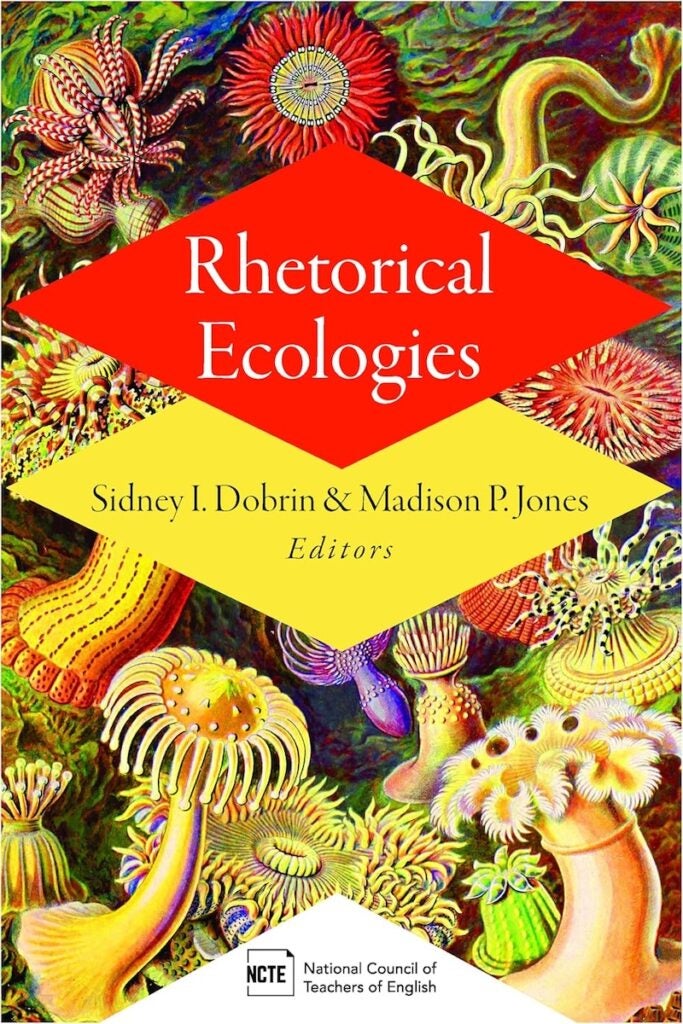Madison Jones, assistant professor of professional and public writing and natural resources science at the University of Rhode Island, is helping both students and scholars shift the ways that we approach writing and rhetoric, specifically in the context of environmental advocacy. His work focuses on the connections and history between ecosystems and a concept known as rhetorical ecologies. Rhetorical ecology is a framework that blends environment with writing and recognizes the complex, dynamic, ever-changing nature of how we communicate, think, and create knowledge. Jones notes that “when scholars are talking about an ecology, what they are referring to is a dynamic and emergent, as opposed to a static and fixed, way of thinking about discourse and communication. In the context of rhetoric and writing, I would say an ecology is a way of thinking about, communicating, and making knowledge that is dynamic. It is not fixed on a sole author or audience; it recognizes that discourse is expansive and complex.” Jones and co-editor Sid Dobrin’s recent book Rhetorical Ecologies dives deeper into the history behind, and contemporary work that employs, ecology as a term and concept within writing and rhetoric.

Written for scholars and academics who are studying writing and rhetoric, Rhetorical Ecologies intends to clarify what Jones calls a “contemporary touchstone in the field.” In the book, Jones and Dobrin note how the word ecology itself risks becoming an empty term in fields that involve rhetoric and writing. Jones emphasizes the need for a deeper understanding of what it means to call something an ecology. “Ecology is such a buzzword in our field: to call something an ecology is just to call it a text now,” he says. “We wanted to dig in and ask, what do you mean when you call something an ecology? The word ecology itself has a history of colonialism and extraction associated with it that we also need to be cognizant of.” They see value in breaking down the term to dive deeper into its meaning and usage.
Jones shares one of the reasons he and Dobrin created this collection for writing and rhetoric scholars: “The way we frame its importance is that so many other people are using it right now that we need to be a little bit more critical about how we’re using it. If we just treat it as a hackneyed term, it really loses its meaning,” he says,” And the other thing is that, as I note in my classes, ecology has a really long and complicated history, spanning from the 19th century to today. And there’s a lot of big knowledge problems that have long plagued ecology as a discipline. And if we just bring the word in, we are carrying all of that baggage in with it. And so if we don’t understand the ecology part first, then our rhetoric is going to be influenced by it. Through this book, we are trying to create a corrective for that.”
In addition to helping readers rethink the meaning of ecologies, Jones and Dobrin also aim to shift how rhetoric is taught and thought about. Jones talked about the history of rhetoric studies, noting that “rhetoric, at least as practiced in U.S. institutions, has long been treated as a more strict and sterilized concept. It was much easier to ask, ‘what is the audience, what is the pathos and ethos and logos, etc.,’ and use these rigid approaches to rhetoric and writing. We’re trying to correct some of that, and also track how the field has changed from those practices.” Citing writings such as Byron Hawk’s book A Counter-History of Composition: Toward Methodologies of Complexity, Jenny (Edbauer) Rice’s paper “Unframing Models of Public Distribution: From Rhetorical Situation to Rhetorical Ecologies,” and Felix Guattari’s book The Three Ecologies, Jones and Dobrin investigate ways that rhetoric has evolved in contemporary writing. “Rhetorical ecologies is identifying the move toward…treating the act of writing as a distributive thing. It’s the influences of everything around us interacting that leads us to an idea or concept,” says Jones. His goal, through both his latest book and his course teachings, is to encourage students to look at rhetorical ecologies as a pathway for how messages circulate, how one thinks about the use of words and concepts in writing, and how knowledge is created and shared. Rather than seeing it as silos of writers sharing knowledge within their respective disciplines, he wants students to see it as a comprehensive, interconnected process that considers the various contexts and histories that shape how messages circulate.
Rhetorical ecologies involves an interdisciplinary approach to writing, communicating, thinking, and sharing knowledge. “Many of the knowledge problems we suffer from today are the result of us carving up knowledge into these super specialized disciplinary areas,” Jones says. He compares this problem to an example he heard from a professor while a student at the University of Florida, in which intractable social and environmental problems could be compared to an airplane in which each of its parts are taken apart and separated, rendering the plane unable to fly. Just as a plane is only effective as the sum of its parts working together, the sciences and humanities must utilize knowledge from all different fields and approaches to knowledge-making in order to effectively share and communicate knowledge. Writing and rhetoric, especially within the sciences, requires a multi-faceted, interdisciplinary way of thinking and connecting with audiences. One must consider the other contexts that exist in the world: the historical, social, cultural, linguistic, and societal ways in which knowledge exists and is circulated.
Rhetorical Ecologies is available for purchase via both print and eBook.
~ Written by Yvonne Wingard, CELS Communications Fellow

